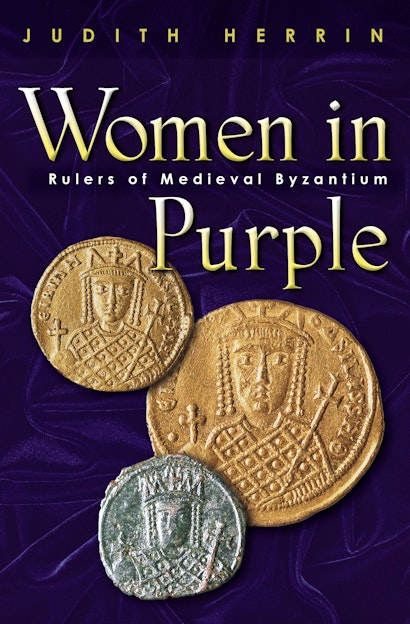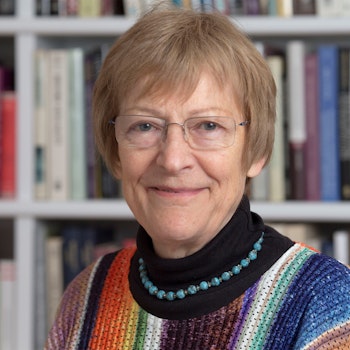In the eighth and ninth centuries, three Byzantine empresses—Irene, Euphrosyne, and Theodora—changed history. Their combined efforts restored the veneration of icons, saving Byzantium from a purely symbolic and decorative art and ensuring its influence for centuries to come.
In this exhilarating and highly entertaining account, one of the foremost historians of the medieval period tells the story of how these fascinating women exercised imperial sovereignty with consummate skill and sometimes ruthless tactics. Though they gained access to the all-pervasive authority of the Byzantine ruling dynasty through marriage, all three continued to wear the imperial purple and wield tremendous power as widows. From Constantinople, their own Queen City, the empresses undermined competitors and governed like men. They conducted diplomacy across the known world, negotiating with the likes of Charlemagne, Roman popes, and the great Arab caliph Harun al Rashid.
Vehemently rejecting the ban on holy images instituted by their male relatives, Irene and Theodora used craft and power to reverse the official iconoclasm and restore icons to their place of adoration in the Eastern Church. In so doing, they profoundly altered the course of history. The art—and not only the art—of Byzantium, of Islam, and of the West would have been very different without them.
As Judith Herrin traces the surviving evidence, she evokes the complex and deeply religious world of Constantinople in the aftermath of Arab conquest. She brings to life its monuments and palaces, its court ceremonies and rituals, the role of eunuchs (the “third sex”), bride shows, and the influence of warring monks and patriarchs. Based on new research and written for a general audience, Women in Purple reshapes our understanding of an empire that lasted a thousand years and splashes fresh light on the relationship of women to power.
Awards and Recognition
- Judith Herrin, Winner of the 2016 Dr A.H. Heineken Prize, Royal Netherlands Academy of Arts and Sciences
Judith Herrin is professor emeritus in the Department of Classics at King’s College London. Her books include Ravenna: Capital of Empire, Crucible of Europe; Byzantium: The Surprising Life of a Medieval Empire; Unrivalled Influence: Women and Empire in Byzantium; Margins and Metropolis: Authority across the Byzantine Empire; and The Formation of Christendom (all Princeton). She lives in Oxford, England.
"[Herrin] has succeeded in writing a scholarly study [that] opens up a new perspective on a vital period of Byzantine history, [and] one that is eminently accessible to a wider public. It is also superbly illustrated."—Michael Angold, Times Literary Supplement
"A work of remarkable scholarship. . . . Throughout her book, the author explains the court intrigues and theological debates with outstanding clarity."—Bart McDowell, Washington Times
"Herrin's study provides important glimpses into medieval history as well as the daily lives and rituals of Byzantine imperial women. . . . [Her] book is the most accessible of the few currently available on this topic."—Publishers Weekly
"Throughout history, the dynastic and political role of ruler has been the prerogative of men, with some notable exceptions. In medieval Byzantium, there were three such rarities: Irene, Euphrosyne and Theodora. Gaining considerable power as emperors' wives, they continued to wield authority as widows and helped alter what is now a singular aspect of Byzantine culture its iconography. Reversing the ban on holy images that was fashionable at the time, they helped restore icons to a prominent position in Eastern Christian worship."—Washington Post Book World
"Herrin traces the lives of three Byzantine empresses of the late eighth and early ninth centuries. . . . [She] deals with the contradictions inherent in being a female ruler and the ways in which the three women used and manipulated the structures and symbols of Byzantine power. . . . The book is lightly footnoted, has an excellent discussion of the problems of finding sources about women during this period, and is written in a clear style accessible to general readers interested in historical biography."—Choice
"Judith Herrin's book not only illuminates the lives and significance of three medieval Byzantine empresses who are scarcely known outside of the field, but she uses their lives to bring this entire period as well as its history and general significance to life. Through these three extraordinary women, Herrin will introduce a wide public to this important yet neglected period. It is time for a new Byzantium to emerge, and this book is a very good step in that direction."—Susanna Elm, University of California, Berkeley


